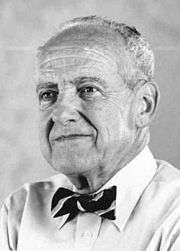Nathaniel Wyeth (inventor)
| Nathaniel C. Wyeth | |
|---|---|
|
Nathaniel C. Wyeth | |
| Born |
October 24, 1911 Chadds Ford, Pennsylvania, United States |
| Died | July 4, 1990 (aged 78) |
| Nationality | American |
| Alma mater | University of Pennsylvania |
| Occupation | inventor, chemical engineer |
Nathaniel C. Wyeth (October 24, 1911 – July 4, 1990) was an American mechanical engineer and inventor. He is best known for creating polyethylene terephthalate that could withstand the pressure of carbonated liquids. Made of recyclable PET plastic, lighter than glass and virtually unbreakable, Wyeth's invention is used widely today for both carbonated and non-carbonated drinks.
Biography
Born in Asgard near Chadds Ford, he displayed an engineering talent throughout his youth. Wyeth held a bachelor's degree in mechanical engineering from the University of Pennsylvania. He married Caroline Pyle in 1937. Biographer David Michaelis found less evidence than some local residents who were inclined to think Caroline and Wyeth's father, N. C. Wyeth, carried on a relationship.[1] Caroline died in 1973 and later Wyeth married Jean Grady in 1984.[2]
Wyeth and Caroline had five sons, Howard, N. Convers, Andrew, John, and David, and one daughter, Melinda, who died very young.[3] A sixth son (their first), Newell, died in 1945 with N.C. Wyeth (Wyeth's father), when their car stalled on a railroad crossing near their home and they were struck by a milk train.[1]
Wyeth is also known as the brother of painters Andrew Wyeth and Henriette Wyeth Hurd, the father of musician Howard Wyeth, and as the son of artist and illustrator N. C. Wyeth.[4]
Wyeth often called himself "the other Wyeth" because N.C. and Andrew Wyeth were so well known.[2]
Career
Wyeth joined DuPont in 1936 as a field engineer. By 1963 he was the company's first engineering fellow and when he retired in 1976, was DuPont's first senior engineering fellow, the company's highest technical position.
In 1967, he pondered whether soda could be stored in plastic bottles. After experimenting with a plastic detergent bottle that proved incapable of withstanding the forces of pressurized liquids, he realized that a much stronger material would be required. He initially experimented with polypropylene, but ultimately settled on polyethylene terephthalate as the material and received the patent in 1973.
Wyeth received the 1981 Society of Plastics Engineers international award for outstanding achievement, and was inducted into the Society of the Plastics Industry Hall of Fame in 1986. He was a fellow of the American Society of Mechanical Engineers.
Wyeth was the first person ever named senior engineering fellow at DuPont, the company's highest technical position. Nathaniel invented or co-invented twenty-five products.[2] In 1990, Wyeth was award DuPont's Lavoisier Award for Technical Achievement.
Wyeth's other innovations included improvements to manufacturing process, plastics, textiles, electronics and mechanical devices.
Notes
- 1 2 Gopnik, Adam (November 15, 1998). ""Pictures Great," His Publisher Told Him, review of N. C. Wyeth by David Michaelis". New York Times. Retrieved 2007-02-18.
- 1 2 3 Lemelson-MIT Program (August 1998). "Inventor of the Week Archive: The plastic soda bottle". Retrieved 2007-02-18. and Fowler, Glenn (July 7, 1990). "N. C. Wyeth, Inventor, Dies at 78; Developed the Plastic Soda Bottle". New York Times. Retrieved 2008-03-29.
- ↑ New York Times (March 29, 1996). "Howard Wyeth, 51, A Rock Drummer". The New York Times. Retrieved 2008-03-29.
- ↑ Fisk, Dean (August 5, 1998). "FISKE-L: Re-Nicholas Wyeth / John Fiske & Sara Wyeth". Retrieved 2007-02-19.
References
- MIT Inventor of the Week, Aug. 1998
- The New York Times (August 26, 1984). "Nathaniel Wyeth Weds Jean Grady". Retrieved 2007-02-22.
- Fowler, Glenn (July 7, 1990). "N. C. Wyeth, Inventor, Dies at 78; Developed the Plastic Soda Bottle". The New York Times. Retrieved 2008-03-29.
- Nathaniel C. Wyeth (Filed November 30, 1970, Issued May 15, 1973). "US Patent 3733309 Biaxially Oriented Poly(ethy.ene terephthalate) Bottle, via Google.com". Retrieved 2007-02-19. Check date values in:
|date=(help)
External links
- Nathaniel C. Wyeth at the "Plastics Academy Hall of Fame".
- Nathaniel C. Wyeth at the "Polymer Processing Hall of Fame".
